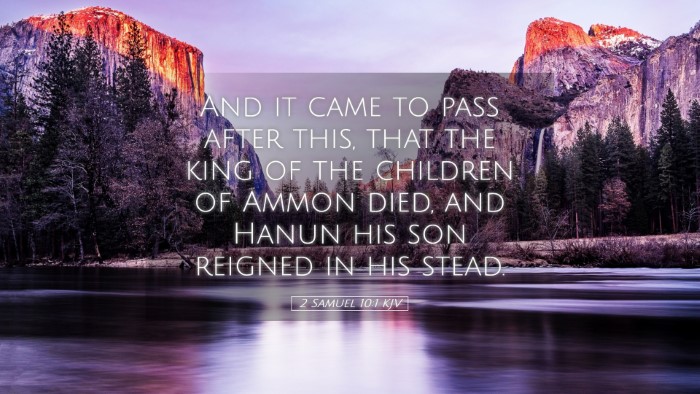Old Testament
Genesis Exodus Leviticus Numbers Deuteronomy Joshua Judges Ruth 1 Samuel 2 Samuel 1 Kings 2 Kings 1 Chronicles 2 Chronicles Ezra Nehemiah Esther Job Psalms Proverbs Ecclesiastes Song of Solomon Isaiah Jeremiah Lamentations Ezekiel Daniel Hosea Joel Amos Obadiah Jonah Micah Nahum Habakkuk Zephaniah Haggai Zechariah Malachi2 Samuel 10:1
2 Samuel 10:1 KJV
And it came to pass after this, that the king of the children of Ammon died, and Hanun his son reigned in his stead.
2 Samuel 10:1 Bible Commentary
Bible Commentary on 2 Samuel 10:1
Verse: "And it came to pass after this, that the king of the children of Ammon died, and Hanun his son reigned in his stead."
Introduction
This verse introduces a pivotal moment in the historical narrative of Israel under King David. As we delve into the commentary from various respected sources, we can derive not only the historical context but also the theological implications of this transition of power in the kingdom of Ammon.
Historical Context
The death of the Ammonite king marks a significant shift in international relations, particularly between Israel and Ammon. This opening establishes an opportunity for David, who had previously sought to engage with Ammon through diplomacy and support. Understanding this context aids in appreciating the subsequent actions that follow in the narrative.
Insights from Matthew Henry
Matthew Henry emphasizes the divine significance behind the events aligning with the transition in Ammon. He notes:
- God's Sovereignty: Henry points out that every kingdom, even those opposed to Israel, falls under God's sovereignty. The transition from one king to another serves as a reminder of God's control over the nations.
- Opportunity for Action: The new king, Hanun, represents both an opportunity and a challenge for David. Henry brings to light that diplomatic relations are often determined by the character of the new leader.
- Human Relationships: He reflects on the importance of relationships and how the previous king, Nahash, had shown kindness to David, setting a precedent for potential alliance.
Insights from Albert Barnes
Albert Barnes analyzes the socio-political dynamics at play, providing a contemporary lens on the significance of Hanun’s reign. He states:
- Succession and Alignment: Barnes notes that when a new ruler ascends, policies and alliances can drastically change, thus highlighting the uncertainty in the relationship between Israel and Ammon.
- The Call for Diplomacy: He underscores David's responsibility to reach out to Hanun, indicating that diplomacy is essential in securing peace and preventing conflict.
- Lessons in Leadership: Barnes reflects on the importance of wise leadership — the new king’s decisions would impact not just Ammon, but its relations with surrounding nations, including Israel.
Insights from Adam Clarke
Adam Clarke provides a more detailed analysis of the implications of Hanun's ascension through historical lens and scripture:
- Character Examination: Clarke suggests that the character of Hanun, who is untested, is crucial to understanding the future relationships with Israel. His mention of the potential for cruelty suggests a prophetic warning regarding his intentions.
- Historical Precedent: Clarke references previous interactions between Israel and Ammon, drawing parallels to emphasize the fluctuating alliances that characterize Ancient Near Eastern politics.
- Preparation for Conflict: Clarke prepares the reader for the interplay of events that would lead towards warfare, invoking the idea that intrigue often follows moments of leadership change.
Theological Implications
The transition in leadership presents rich theological themes worthy of deeper exploration:
- Divine Providence: The timing of events is suggestive of God’s providence working behind the scenes. The rise and fall of kings are orchestrated by the Almighty.
- The Nature of Human Relationships: This verse showcases the necessity of fostering goodwill and the potential spiritual ramifications of neglecting such diplomatic efforts.
- Conflict and Resolution: The forthcoming strife serves as a reminder of humanity’s constant struggle for peace, reflecting the broader biblical narrative of conflict resolution.
Conclusion
In summary, 2 Samuel 10:1 marks not only the death of one king but also the potential for new alliances or conflicts. The insights from Henry, Barnes, and Clarke encourage readers to reflect on the intricate relationship dynamics that characterize this transition. For pastors, students, theologians, and Bible scholars, this commentary invites further study into the implications of leadership changes both in biblical times and in our contemporary context.


